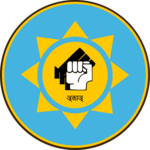People's Liberation Army of Chanda
| Ardyn Kalaman Armi 𑐀𑐬𑐡𑐫𑐣 𑐎𑐵𑐮𑐵𑐩𑐵𑐣 𑐀𑐬𑐩𑐶 | |
 | |
| Agency overview | |
|---|---|
| Formed | 28 February 1931 (as militia) 28 April 1951 (as military) |
| Preceding | |
| Type | Paramilitary Gendarmerie Business enterprise |
| Jurisdiction | |
| Headquarters | Taglikend, Chanda |
| Employees | 560,000 (2020 estimate) |
| Annual budget | $2.36 billion (2020) |
| Commander in Chief responsible | |
| Agency executives |
|
| Child agencies | |
| Website | aka |
The People's Liberation Army (Chandan: 𑐀𑐬𑐡𑐫𑐣 𑐎𑐵𑐮𑐵𑐩𑐵𑐣 𑐀𑐬𑐩𑐶, Ardyn Kalaman Armi), is an Chandan paramilitary, originally founded as an militia affiliated with the International Revolutionary Army in 1931. Formerly a military force and governing power of the West Shalegho Commandery, its role has significantly diverged from its origins. Today it uses its own sub-branches, the Kharuul, the Labour Corps, and the Engineer Corps to run the country’s economic system as part of its mission of maintaining the country's internal order.
The Army traces its origin to the Chandan Resistance who fought the Heavenly Xiaodongese Empire during the Great War and later governed the West Shalegho Commandery from 1934 to 1951. Like other Pardal Republics, the People's Liberation Army directly controlled and governed the region; while the civilians were largely left to their own affairs, the PLA provided security and other assistance. When the Republic was founded, the PLA was allowed to maintain some autonomy and keep its economic and military assets, which was reorganized into the Internal State. Furthermore, the role of the PLA was enshrined in the Declaration of the Republic, tasked to "protect and serve" the country and its people. Sabir worked closely with his allies in the PLA to implement his policies, which further increased their power and their popularity among the people. Its economic role soon eclipsed its military role and it abandoned most of its military functions. Today, the People's Liberation Army has a significant social, political, military, and economic role within Chandan society.
The exact nature of the People's Liberation Army is subject to considerable debate. While it officially claims to be an armed force and maintains a traditional military structure, its military role has been long superseded by its economic role. The Labour Corps are wholly concerned with economic affairs, such as operating Army-owned businesses or providing workers to local governments and private companies and the Engineering Corps is tasked with constructing civil works and other large construction projects. The only traditional military force it has today is the the Kharuul, an gendarmerie tasked with internal security and law enforcement. Furthermore while it is technically subordinate to Chanda's government, it nevertheless maintains a notable degree of autonomy in decision making. Finally as it is simultaneously in charge of implementing economy policy and is the largest force in the economy, it wields significant power and influence in the country. The PLA itself is widely considered to be a state within a state, and various political factions and organizations affiliated with the PLA form the powerful System.
History
Status
The People's Liberation Army operates with considerable autonomy from the Republic of Chanda. While the PLA is officially subservient to the state, it is largely able to make its own decisions with minimal input from the government. It manages its own finances which are independent from the national budget, although the Army has to pay taxes and there is some state oversight such as providing its accounting reports to the National Assembly.
The Army is the second largest landowner in the country, aside from the central government as the Constitution allows the PLA to own, buy, sell, and administrate their own "military owned land". The Army's directly owned land, known as the Internal State, is subject to the Army's own administration and has autonomy. It is considered as a dependent territory, subject directly to the Army's jurisdiction rather than the Chandan government. Inside its own land, the Army can set its own rules and regulations and try rule breaking it its own judicial system. Nevertheless, it still must follow the country's constitution.
Role
The People's Liberation Army is intertwined with the Chandan economy as it operates numerous Army-owned businesses in almost all sectors of the economy. As a result, along with the National Bank of Chanda it is one of the country's key economic institutions, able to steer the economy mostly on its own.
Influence
The People's Liberation Army is broadly popular within Chanda, although its not free from criticism or controversy. Conservative Birlikists and other nationalists view the Army as a vital institution, and a guardian of the country who keeps the country safe and prosperous. It is also popular as it provides employment to Chanda's citizens as well as goods and services. However the degree of independence from the state that the Army enjoys has attracted criticism internationally and domestically, due to a lack of oversight and accountability. In addition it has been accused of abusing its economic power, such as driving out foreign competition in quasi-legal ways. Finally crimes and other incidents committed on army land or by army personnel can only be investigated and tried in military courts, which has led to accusations of conflicts of interest and lack of accountability.